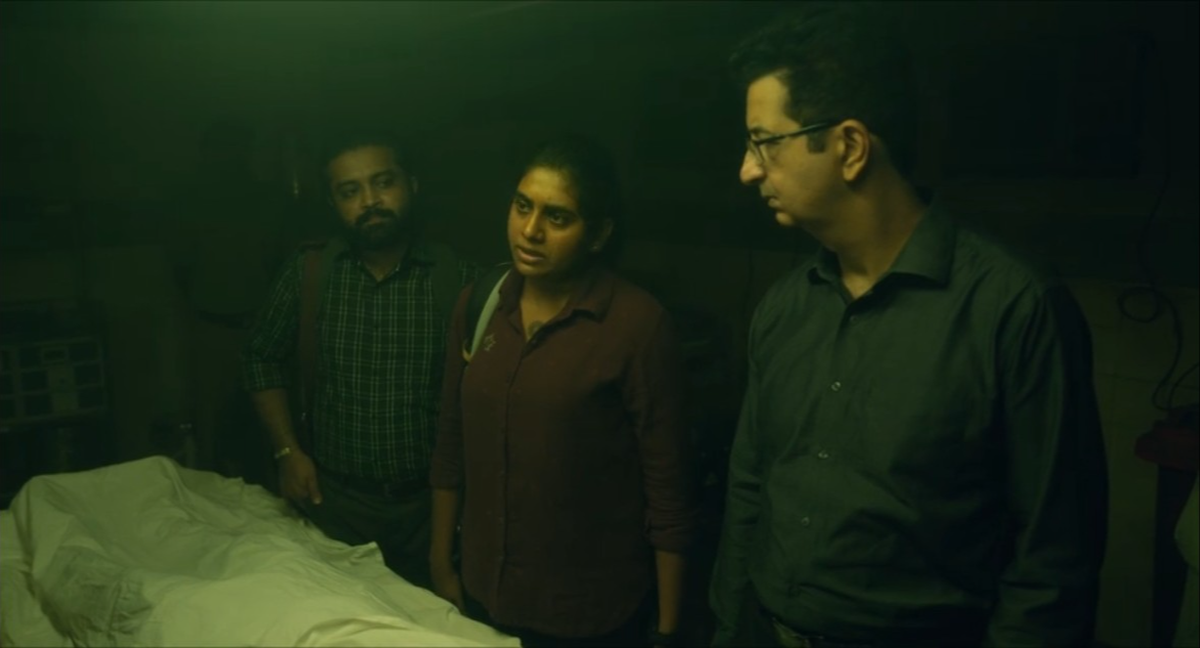
A still from ‘Poacher’
Five years after Delhi Crime, Richie Mehta returns with a dense, detailed and somewhat airless series spun from a litany of harsh facts. In the 1990s, the forests of Kerala were a buzzing hot zone of a notorious ivory trafficking racket. Following committed interventions, the poachers were flushed out and their creed outlawed. But a couple of decades later, they reappeared, killing again at scale. In 2015, The Guardian ran a piece on the poaching of 28 tuskers in Thrissur and other parts of South India. For state forest officials, it was a source of embarrassment and a clarion call to action. As Neel, a gruff and iron-willed field director played by Dibyendu Bhattacharya, says in Mehta’s series: “This is not easy press to get.”
Poacher — executive produced by Alia Bhatt and streaming on Prime Video — dramatises Operation Shikar, which led to one of the largest ivory seizures (around 500 kgs) in the country. In Malayatoor, an aging forest watcher, drunk and conscience-stricken, confesses to his participation in the stealing of raw ivory. His whistleblowing exposes the contours of a larger ring, from the foothills of the Western Ghats to the pristine art galleries of Delhi. Mala Jogi (Nimisha Sajayan), a talented range officer posted at the Thattekad Bird Sanctuary, is reinstated by Neel to breach the racket (before their meeting, Mala stops outside the station and breathes in the cold night air, home at last). Mala is soon joined in this operation by Alan (Roshan Mathew), a nimble data analyst whose real métier is conservation.
Also Read | The truth behind tusker deaths
Like Vidya Balan in Sherni, Mala is spirited and skilled, a calm crusader with eyes and ears to the ground. She has a personal cross to bear: her father, we learn, was a big-game hunter; his unsavory crimes put food on the table. Mala values nothing more than preserving the ecology and bringing the evil poachers and their buyers in. So does Alan, Neel and most of the other crime-fighters in the show. They keep late hours, ignoring their personal lives and well-being. Mehta has based these characters on real-life heroes; this reverence, however, comes at the cost of drama. There are no conflicting philosophies to animate the chase. The rangers are painfully synchronised in their goodness; it’s the occasional cop, instead, who is shallow and short-sighted.
Poacher (Malayalam, English, Hindi)
Director: Richie Mehta
Cast: Nimisha Sajayan, Roshan Mathew, Dibyendu Bhattacharya, Kani Kusruti, Sooraj Pops
Episodes: 8
Run-time: 40 to 60 minutes
Storyline: In Kerala, a team of committed forest officials crack down on a resurgent ivory smuggling racket
Throughout Poacher, there’s talk of a nefarious transnational syndicate. We’re told how the illegal ivory trade funds global terrorism. Mehta attempts to tie in wider realities — Neel, who is ex-RAW, is chided at one point for using his ‘Kashmir’ tactics in the wild — yet the show begins to really sing in the latter episodes, while unearthing home truths on the ground. Though the killing of wildlife was banned in the country, the locals continued to view the hunters with a mix of fascination and respect. Mala asks her mum if her late father would have reformed with time. “Reformed? Like Jim Corbett?” comes the response. There is also the sad everyday reality of captive elephants, held in large estates and used for religious processions and public entertainment, tips of their tusks pruned for ivory.
Malayalam actor Nimisha Sajayan is engaging as Mala. Through a tough exterior, she conveys the disgust and mortification of someone who routinely bruises against hard truths. Mathew is always less involving when playing clean-cut, morally upright characters, though he finds moments of lightness and humour (like asking a suspect if he attends church on Sundays and later presenting the same reasoning to draw his trust). As the hard-shelled Neel, obsessed with turtles, Bhattacharya is the most wise and fascinating presence, watchful and always on the move, too pressed for time for sympathy.

Nimisha Sajayan as Mala Jogi in ‘Poacher’
Unlike Sherni, which drove home its big ecological points through satire and black humour, Poacher isn’t immune to platitudes: “Elephants are the engineers of the forest”, “We city-dwellers don’t care about wildlife”, “The chain of command is non-functioning.” The series is primarily in Malayalam with a smattering of Hindi, English and Bengali, but some of the writing, especially in the Delhi portions, falls noticeably flat. The narrative unfolds as a series of raids and arrests, most of them filmed at night or in the blue-grey of dusk and dawn. Mehta and cinematographer Johan Heurlin Aidt come up with the interesting visual idea of having CG animals casually cross the frame, wordlessly indicating their lost habitats. The symbolism is cleverly picked: shelves of Ganesha idols, carved from ivory; Alan sending a ‘Trojan Horse’ to hack a computer.
“If we observe the patterns, we can develop a plausible story,” Alan tells Mala early on. He’s explaining the dry art of parsing Call Detail Records (CDRs), but the idea extends to Mehta’s filmmaking approach, which is clinical, time-consuming and rooted in research. His new series is a restrained yet sobering look at the man-animal conflict, as elegiac as it is hopeful. In one scene, addressing the plight of captive elephants, a character calls it their punishment for “being on the same planet as us”. It is a numbing line, yet it also rings true.
Poacher is streaming on Prime Video
#Poacher #series #review #Sharp #sobering #thriller #Indias #ivory #trade



